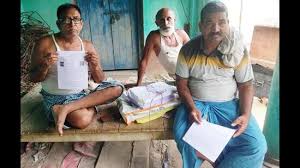Aim to ensure no eligible voter left out, no ineligible voter in list: CEC amid Opp heat

New Delhi, July 1 – Chief Election Commissioner Rajiv Kumar has said that the Election Commission of India (ECI) is focused on clean, inclusive electoral rolls. He made it clear that every eligible citizen must find their name on the voter list, and those who don’t qualify should not appear.
Kumar made this statement at a press briefing in New Delhi, amid growing criticism from opposition parties. These parties have raised concerns over voter list irregularities in recent elections. Several leaders claimed that valid voters were missing, while fake or duplicate names remained.
Electoral Rolls Must Be Accurate and Inclusive
Kumar stressed that fair elections start with accurate voter rolls. “We are working to ensure that no eligible voter is excluded. At the same time, no ineligible person should remain on the list,” he said.
He also emphasized the role of the voter list in protecting democracy. “If the rolls are not accurate, the entire election process loses credibility,” he added.
Political Heat Over Voter Lists
The CEC’s statement follows strong criticism from opposition leaders. They accused the ECI of overlooking errors and ignoring complaints. Parties like Congress, AAP, and DMK claimed that voter deletions happened without proper notice.
In some areas, voters reported reaching polling booths only to find their names missing. Others said they saw unfamiliar names listed under their addresses. These cases led to demands for better verification and more transparency.
Opposition leaders also urged the Commission to conduct third-party audits of voter lists. They believe that only independent reviews can restore public trust.
Commission’s Steps to Improve the Process
Kumar responded to these concerns by outlining the ECI’s recent efforts. He said the Commission has taken steps to update the voter rolls regularly. “We are using new tools to detect errors. But technology alone isn’t enough. We also need support from citizens and political parties,” he said.
Some of the changes include:
- Continuous voter roll updates instead of waiting for elections
- Mobile app tools that let voters check and fix their details
- Booth-level officers (BLOs) doing physical checks more often
- Special registration drives in slums, tribal areas, and remote villages
He said these actions help reach people in underserved regions. “We’re trying to reach every corner, from cities to far-flung villages,” Kumar said.
Using Technology to Clean Up Rolls
The Commission has adopted digital tools to make voter data more accurate. Artificial intelligence now helps find duplicates and deceased voters. These tools compare databases and flag possible issues.
Kumar said, “We use AI, but we also need people on the ground. Booth-level officers verify voter details locally. Their role is essential.”
Citizens can now download the Voter Helpline App to verify their entries. The app allows people to correct mistakes or apply for new registration. The Commission also sends BLOs door to door in sensitive areas.
Awareness Drives to Reach the Last Voter
The ECI has stepped up its voter education programs. Under the SVEEP campaign (Systematic Voters’ Education and Electoral Participation), the Commission runs outreach activities in schools, colleges, markets, and villages.
These programs teach people about their voting rights and how to register. Kumar noted that many voters, especially in urban areas, still don’t check their status in advance. “We urge everyone to confirm their names before polling day,” he said.
Urging Political Cooperation
Kumar also addressed the ongoing tension between the Commission and political parties. “Elections work best when all sides take responsibility,” he said. He urged political parties to work with the ECI rather than attack its integrity.
“Raising concerns is fine. But please provide facts. We are ready to investigate and act on valid issues,” he added. Kumar warned that unfounded allegations can damage public trust in democratic systems.
He called for constructive dialogue between the Commission and all stakeholders. “Let’s build systems that everyone can trust,” he said.
Looking to the Future
India’s election system must handle over 960 million registered voters. That number will grow in coming years. The Commission is now preparing for upcoming state elections and looking ahead to the 2029 Lok Sabha polls.
Kumar outlined future goals, including:
- Remote voting options for migrant workers
- Stronger checks through integration with government ID systems
- More training for local election officials
Experts welcomed these plans. Former CEC S.Y. Quraishi recently said, “India’s elections are among the largest in the world. But we need to keep improving, especially at the grassroots.”
Conclusion: A Trusted Electoral System
The CEC’s remarks underline the importance of trust, transparency, and accuracy in elections. Every vote counts, and the system must protect that principle. The goal is clear: include everyone who is eligible and exclude those who are not.
As Rajiv Kumar stated, “We will do whatever it takes to build a cleaner, fairer voter list. Democracy demands nothing less.”
With better tech, more awareness, and support from voters and parties, the Commission hopes to deliver more reliable elections in the years ahead.






